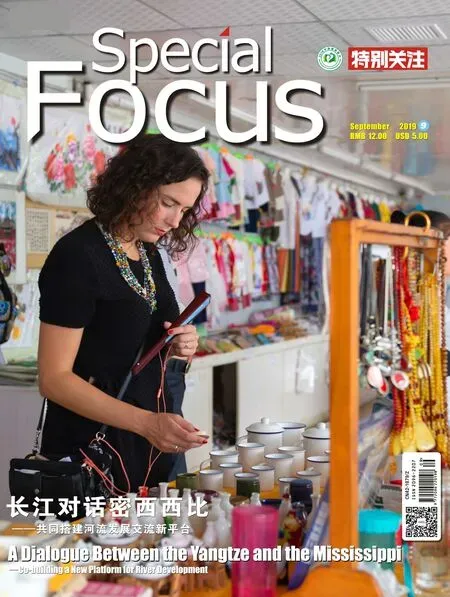The Making of a Good Chef
By Zhang Hailin
What is the core essence of Chinese cuisine? Technically, it covers “extensive absorption and adoption, obtainment of cooking knowledge by familiarity with things, rational assortment and elaborative processing,” followed by the famous Chinese dictum that “Application with ease lies in a masterful mind.” What on earth does it mean? Honestly, a chef of Chinese cuisine is truly a craftsman.
I have a strong objection to duplication, regarding that it is always the small restaurants or mom-and-pop luncheonettes that decide the development trends of the culinary industry. I am a chef, working together with my wife, one of us in charge of the front of house services and the other back in the kitchen. Each day we serve our customers just enough for a table. With the same food and the same way of cooking, however, you'll never get the same taste elsewhere. This is the guideline—not a large crowd of restaurants run by many.
Why so? Cooks are very interesting. I often tell my staff that in cooking a dish like fried pork slices, those done by a cook of twenty years' experience will definitely taste different from one done by a cook with two years' practice, and also dishes would vary from a chef in good humor to one in bad mood.
My mentor once told me a story.
Once upon a time, a frequent diner came in and took his seat after ordering roasted tofu. After having a taste with a pair of chopsticks when his tofu was served, he said, “Take it away! This is not for me.”
The waiter got displeased and said, “This is exactly what you ordered.”
The diner asked, “Say, who's in the kitchen? Who's the cook?”
The headwaiter came and asked, “What's wrong with the dish, sir?”
The diner said, “This dish is not for me. Listen, the tofu is overdone.”
On hearing this, the headwaiter argued, “How could you say so! Tofu overdone? I've been in this line of work for twenty years and never heard that tofu could be overdone!”
“You don't agree, do you?” then the diner took the tofu into the kitchen, asking “Who is the cook?”
A cook appeared and said, “I cooked it. What's wrong with it?”
The diner said, “The tofu is overdone.”
“I have been doing this for thirty years, and you say it is overdone?” the cook replied, illaffected.
“You did the tofu for another guy, who did not take it, and then you warmed it up again for me. I tell you, tofu would be very tender when it is heated the first time. Once it is reheated, it gets tough and taste different.”
中国烹饪的基本东西是什么呢?从技术上讲,“广采博取、格物致知、合理搭配、精细加工”,后面还有八个字:“运用之妙,存乎于心”。什么意思呢?中餐厨师是个工艺师。
我历来反对复制,总认为餐饮发展趋势是小馆子、夫妻店。我是厨子,我和太太两口子,一个管着前头,一个管着后头,一天就卖一桌饭,就这个活儿,就这个技术,你在别的地方吃不到我这个味。这是方向,并不是大家一开开多少个店。

为什么呢?厨师很有意思,我经常告诉他们,同样一个炒肉片,干过二十年的跟干二年的炒出来就是不一样;厨子高兴的时候和不高兴的时候,炒出来的菜也不一样。
我师傅讲过一个故事。
有一次,老食客要了个烧豆腐,往那儿一坐,烧豆腐上来后,拿筷子一尝,说,端走,不是给我做的。
堂倌不愿意了,说,这就是给你做的。
他问,今天谁在厨房?谁的灶头?
一会儿堂头跑来问,您老说,这怎么了?
老食客说,这个菜不是给我炒的,记着,这个菜老了。
堂头一听,哪有你这么说话的,烧豆腐老了?我干了二十年,没有听说烧豆腐老了。
老食客说:“你不服不是?”然后我们这个食客端着豆腐到厨房,说,谁的灶头啊?
The cook was surprised and exclaimed, “Oh, My lord! You are such an expert!”
Such is the property of tofu. Once it keeps turning, tumbling, and tossing in the pot, it would taste smooth to the tongue, but if you boil it again after it gets cold, it will have a different taste. It is the same reason that when cooking fish, say, braised in brown sauce, the fish must be fully fried first in hot fire and then in gentle heat—it is ready to be served when the seasoning's flavor gets into the fish, but never take it off the heat too long and serve a dish of cold fish to your customers. To make braised fish, you must fry it first, and braise directly after coating it with starch. Many people who go to restaurants on the Spring Festival complain about the fish there. Why? Usually, the fish was fried several days before and put aside for further processing, especially for wedding banquets. During this period, it gets dehydrated and dry. It surely tastes different from fresh fish.
I often say, to be a good cook, you have to keep in mind that “Application with ease lies in a masterful mind.” Dishes cooked in a fine or foul mood can produce different tastes. A step out the door, your wife seizes you to check how much money you take in your pocket to keep you from drinking outside, with a shed of such-and-such nonsense. All your operations will be irregular when at work. Just the same as athletes, artists or calligraphers, if you don't play well, the fried dishes will not taste right when you eat them.
We used to jest with our workmates. Whenever we found any undesirable tastes in a dish, we would tease the cook, “Who did it? Had a row with your wife back at home? Anything happened? In love with someone? In trouble now?”
Our cooks would sample dishes, but not everyone of them. Ginger juice and salt solution are to be tasted first thing on shift every day. We try the salt after it is dissolved so that we can have some idea, and a slight dip with the ladle in it will do when cooking the dishes. In the past time, an apprentice would entrap his master merely by adding a tiny bit of extra salt, and all the dishes would taste more salty. Once you have a nice control of the salt, you can feel at ease with the dishes. Just a few stirs in the pan is enough for many dishes, yet a cook may stir impetuously when he is in a bad mood, unavoidably altering the taste of the dish.
(FromChinese Henan Cuisine: Tracing the Chinese Dietetic Culture, Zhongzhou Chinese Classics Publishing House. Translation: Luo Dongyuan)
一个师傅出来了,说,我的啊,怎么了?食客说,你的豆腐烧老了。
那个师傅说,我干了三十年,豆腐能烧老?很不服气。
食客说,你这个豆腐是给刚才那位烧的,那位没有要,你给我又加热了一次。我告诉你,一次加热是嫩的,只要豆腐凉了再加热,就老了,口感就不一样。
师傅一听,说,我的爷啊,你真是专家啊。
豆腐就是这样,只要豆腐不断滚,在锅里面永远滚着,它的口感就很光滑,只要凉了,你再加热,那就变了。跟鱼一样的道理,像红烧鱼,这个鱼一定要大火溅开,入味之后用小火养着等你吃。如果说把火停了、凉了再给你,那不行了。做红烧鱼,炸好之后挂糊直接烧。过年很多人下馆子,对做的鱼有意见,为什么呢?特别是婚宴,多少天前都炸好了,在那儿撂着呢。你这一撂,一风干,一脱水,你再烧,味就变了,跟鲜鱼不一样。
我经常说,干厨子就是八个字:“运用之妙,存乎于心”。情绪好跟情绪不好炒出的菜不一样。一出门,老婆拉着你,要看你兜里多少钱,不让你在外面喝酒,如何如何,说一通。你一上班,所有动作会变形,跟运动员、跟艺术家、书法家一样,发挥不好,炒出的菜一吃就不对味。
我们过去经常开兄弟们的玩笑,一尝谁的菜味不对,就会问,谁的灶头啊?回家跟老婆吵架了吧?有事儿了吧?谈恋爱了吧?有麻烦了吧?
我们厨师会尝菜,但不是每个菜都尝。每天上班时,姜水和盐水要尝,盐水化开之后尝尝口感,炒菜时心里就有谱,用勺子一点就过去了。过去徒弟坑师傅,给他偷偷加点盐,炒的菜都是咸的。盐味把握住了,菜就把握住了。很多菜下锅,翻炒两下就够,心情不好时会猛翻,味道自然会变。
(摘自《中国豫菜:中国饮食文化寻踪》中州古籍出版社)
——以海盐县通元镇为案例
- Special Focus的其它文章
- A Dialogue Between the Yangtze and the Mississippi—Co-building a New Platform for River Development
- Christian Fardel and His Love for China's Ancient Navigation Culture
- Differences Between Eastern and Western Architecture
- Story of a Pen Repairman
- Story of a Jade Freak
- Seeing People via the Library

